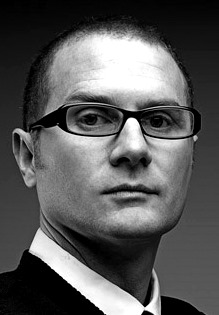 In November 2003 Rob Bell, Jr. spoke at Wheaton College for the annual Staley Lecture Series. His three messages were entitled “Communicating Christ in Contemporary Culture.” Rob Bell is a teaching and founding pastor of Mars Hill in Grandville, Michigan. He is the author of Velvet Elvis and Sex God, and is a coauthor of Jesus Wants to Save Christians. He is also featured in a series of spiritual short films called NOOMA. Rob graduated from Wheaton College in Wheaton, Illinois and Fuller Theological Seminary in Pasadena, California. He and his wife Kristen have three children and live in Grand Rapids.
In November 2003 Rob Bell, Jr. spoke at Wheaton College for the annual Staley Lecture Series. His three messages were entitled “Communicating Christ in Contemporary Culture.” Rob Bell is a teaching and founding pastor of Mars Hill in Grandville, Michigan. He is the author of Velvet Elvis and Sex God, and is a coauthor of Jesus Wants to Save Christians. He is also featured in a series of spiritual short films called NOOMA. Rob graduated from Wheaton College in Wheaton, Illinois and Fuller Theological Seminary in Pasadena, California. He and his wife Kristen have three children and live in Grand Rapids.
Category Archives: Alumni
Dispensation of the Mystery
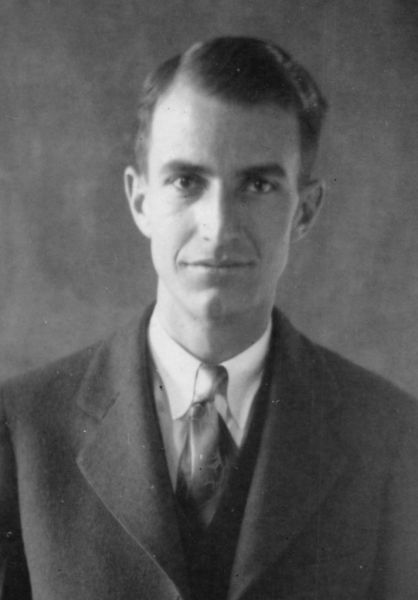 If Charles F. Baker represented an extreme form of dispensational theology, his credentials were impeccable. Born of English immigrant parents in Dallas, Texas, in 1905, he attended Scofield Memorial Church, founded by C.I. Scofield, editor of the Scofield Reference Bible. Baker’s pastor was Lewis Sperry Chafer, who also founded the Evangelical Theological College, which later became Dallas Theological Seminary. Here Baker attended, a highly motivated student, again sitting under Chafer’s ministry. Graduating, Baker entered Wheaton College, accompanied by a letter from DTS registrar Rollin Chafer to Wheaton College registrar Enoch Dyrness. It stated: “Charlie is one of the best students we have ever had in the college and it gives me great pleasure to commend him to your faculty. Not only has his class work been of the highest grade, but he is one of the most spiritual men we have in the institution.” After successful studies at Wheaton Baker moved in 1932 to Milwaukee, Wisconsin, where he ministered for 23 years as pastor of Fundamental Bible Church. He also assisted J.C. O’Hair, pastor of North Shore Church on Wilson Street, Chicago, as chief engineer for broadcasting at station WPCC (We Preach Christ Crucified). In 1939 Baker founded Milwaukee Bible College; and in 1961 moved the school to Grand Rapids, Michigan, where it was called Grace Bible College. Retiring in 1967 he was named President Emeritus and Distinguished Professor of Theology. In 1971 Baker published his 688-page masterwork, A Dispensational Theology. In its preface he wrote: “Very few attempts have been made to produce a work on Theology which is dispensationally oriented. A survey of some two dozen standard works on the subject revealed the fact that more than half of them make no reference whatsoever to the subject of the dispensations. Most of those that do make mention of the Scriptural expression devote only the briefest reference to the subject, and their treatment of it is mainly from the viewpoint of Covenant Theology, which fails completely to recognize the distinctive character of the present dispensation, called by Paul the dispensation of the mystery, a plan and program of God which was kept secret from all former ages and generations (Colossians 1:26). Only one major work on Theology was found which recognized the dispensational principle in the interpretation of Scripture.” After his wife, Teresa, died in 1982, Baker moved to Escondido, California, and was married to a long-time friend, Ruth Lohman Smith, in 1985. Baker’s other books include Understanding the Book of Acts, Dispensational Relationships, and Understanding the Gospels. In addition, he was instrumental in the formation of Grace Gospel Fellowship, Grace Mission and Grace Publications as well as editing two periodicals, the Biblegram and Truth Magazine. He died in 1994.
If Charles F. Baker represented an extreme form of dispensational theology, his credentials were impeccable. Born of English immigrant parents in Dallas, Texas, in 1905, he attended Scofield Memorial Church, founded by C.I. Scofield, editor of the Scofield Reference Bible. Baker’s pastor was Lewis Sperry Chafer, who also founded the Evangelical Theological College, which later became Dallas Theological Seminary. Here Baker attended, a highly motivated student, again sitting under Chafer’s ministry. Graduating, Baker entered Wheaton College, accompanied by a letter from DTS registrar Rollin Chafer to Wheaton College registrar Enoch Dyrness. It stated: “Charlie is one of the best students we have ever had in the college and it gives me great pleasure to commend him to your faculty. Not only has his class work been of the highest grade, but he is one of the most spiritual men we have in the institution.” After successful studies at Wheaton Baker moved in 1932 to Milwaukee, Wisconsin, where he ministered for 23 years as pastor of Fundamental Bible Church. He also assisted J.C. O’Hair, pastor of North Shore Church on Wilson Street, Chicago, as chief engineer for broadcasting at station WPCC (We Preach Christ Crucified). In 1939 Baker founded Milwaukee Bible College; and in 1961 moved the school to Grand Rapids, Michigan, where it was called Grace Bible College. Retiring in 1967 he was named President Emeritus and Distinguished Professor of Theology. In 1971 Baker published his 688-page masterwork, A Dispensational Theology. In its preface he wrote: “Very few attempts have been made to produce a work on Theology which is dispensationally oriented. A survey of some two dozen standard works on the subject revealed the fact that more than half of them make no reference whatsoever to the subject of the dispensations. Most of those that do make mention of the Scriptural expression devote only the briefest reference to the subject, and their treatment of it is mainly from the viewpoint of Covenant Theology, which fails completely to recognize the distinctive character of the present dispensation, called by Paul the dispensation of the mystery, a plan and program of God which was kept secret from all former ages and generations (Colossians 1:26). Only one major work on Theology was found which recognized the dispensational principle in the interpretation of Scripture.” After his wife, Teresa, died in 1982, Baker moved to Escondido, California, and was married to a long-time friend, Ruth Lohman Smith, in 1985. Baker’s other books include Understanding the Book of Acts, Dispensational Relationships, and Understanding the Gospels. In addition, he was instrumental in the formation of Grace Gospel Fellowship, Grace Mission and Grace Publications as well as editing two periodicals, the Biblegram and Truth Magazine. He died in 1994.
Normative, mainstream dispensationalism, as espoused by Dallas Theological Seminary, Moody Bible Institute or Philadelphia Biblical University, might agree with aspects of Baker’s research, but it would vehemently object to many of his assertions. For instance, Baker believed that since Paul does not seemingly mention baptism by immersion after Acts 13, it is not valid for the current dispensation, though the Lord’s Supper should continue to be observed.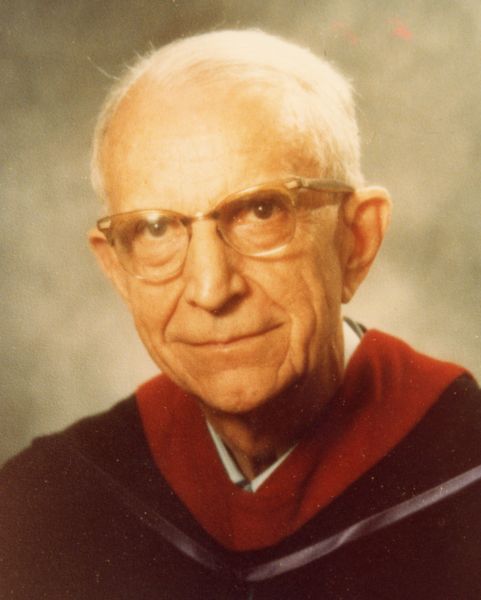 Others, such as E.W. Bullinger and Oscar Baker, held that both baptism and the Lord’s Supper fall outside of the current, post-Acts dispensation, and are not valid church ordinances. Dr. H.A. Ironside, pastor of Moody Church, trustee of Wheaton College and part-time DTS faculty, utters hard words against ultradispensational doctrine in his 1938 apologetic, Wrongly Dividing the Word of Truth: Ultradispensationalism Examined in the Light of Holy Scripture: “I send forth this edition praying that the Lord will use it to deliver many more from the unscriptural and positively harmful teachings of the ultra-dispensationalists who, under the guise of setting forth high truth, are deliberately attempting to rob Christians of the greater part of their Bible.” Despite the controversy attached to his theological stance, Baker was known as a gracious, kindhearted man.
Others, such as E.W. Bullinger and Oscar Baker, held that both baptism and the Lord’s Supper fall outside of the current, post-Acts dispensation, and are not valid church ordinances. Dr. H.A. Ironside, pastor of Moody Church, trustee of Wheaton College and part-time DTS faculty, utters hard words against ultradispensational doctrine in his 1938 apologetic, Wrongly Dividing the Word of Truth: Ultradispensationalism Examined in the Light of Holy Scripture: “I send forth this edition praying that the Lord will use it to deliver many more from the unscriptural and positively harmful teachings of the ultra-dispensationalists who, under the guise of setting forth high truth, are deliberately attempting to rob Christians of the greater part of their Bible.” Despite the controversy attached to his theological stance, Baker was known as a gracious, kindhearted man.
Other prominent ultradispensationalists were Harry Bultema, pastor of Berean Bible Church, and Cornelius Stam, president of the Berean Bible Society and brother of missionary martyr John Stam.
The most wonderful experience of my life….
J. Northcote Deck, born in England in 1875, pursued his education in Australia at the University of Sydney, where he felt a call to ministry. Thereafter he allowed nothing to compete with his single-minded dedication to Christ. Receiving the degree of Master of Surgery, Dr. Deck established a practice in Sydney; but soon he moved to the Solomon Islands as a full-time missionary and engineer, participating in a fruitful work that began in 1882 among South Sea islanders. In 1910 Dr. Deck was the first white man to cross Guadalcanal, then largely unexplored. He led the first exploration of the coral island of Rennell. He then  embarked upon the first crossing of mountainous Malaita, a cannibal island; and on his second visit he discovered a lake and primitive civilization unknown to the outside world. As a result of these exploratory adventures, he was honored by the Royal Geographical Society and made a fellow of the Royal Geographical Society. Encountering disease, weather, poison arrows and innumerable disappointments, Dr. Deck prevailed in his efforts among the natives until retirement in 1927. On the mission field his life of sacrificial service yielded many conversions. But this was true in his latter years, as well, as he traveled around the world, preaching in churches, summer schools, colleges and conferences, including the Keswick Convention in England, which attracted internationally renowned pulpit orators. In addition to speaking, Dr. Deck wrote devotional books, conveying through the written word a consecrated spirituality. This gift was passed to his daughter, Luci Shaw, who has written perceptively in both poetry and prose about faith and art and other issues of the Christian life. In private Dr. Deck was a man of deep prayer, systematic and definite as he daily remembered missionaries positioned around the globe. As he lay on his deathbed, he joyfully, confidently exclaimed to Wilber Sutherland, director for InterVarsity Christian Fellowship, Canada, “Wilber, this is the most wonderful experience of my life!”
embarked upon the first crossing of mountainous Malaita, a cannibal island; and on his second visit he discovered a lake and primitive civilization unknown to the outside world. As a result of these exploratory adventures, he was honored by the Royal Geographical Society and made a fellow of the Royal Geographical Society. Encountering disease, weather, poison arrows and innumerable disappointments, Dr. Deck prevailed in his efforts among the natives until retirement in 1927. On the mission field his life of sacrificial service yielded many conversions. But this was true in his latter years, as well, as he traveled around the world, preaching in churches, summer schools, colleges and conferences, including the Keswick Convention in England, which attracted internationally renowned pulpit orators. In addition to speaking, Dr. Deck wrote devotional books, conveying through the written word a consecrated spirituality. This gift was passed to his daughter, Luci Shaw, who has written perceptively in both poetry and prose about faith and art and other issues of the Christian life. In private Dr. Deck was a man of deep prayer, systematic and definite as he daily remembered missionaries positioned around the globe. As he lay on his deathbed, he joyfully, confidently exclaimed to Wilber Sutherland, director for InterVarsity Christian Fellowship, Canada, “Wilber, this is the most wonderful experience of my life!”
The papers of Luci Shaw (SC-46) and the Keswick Convention (SC-30) are maintained in Wheaton College Special Collections.
There, and back again….
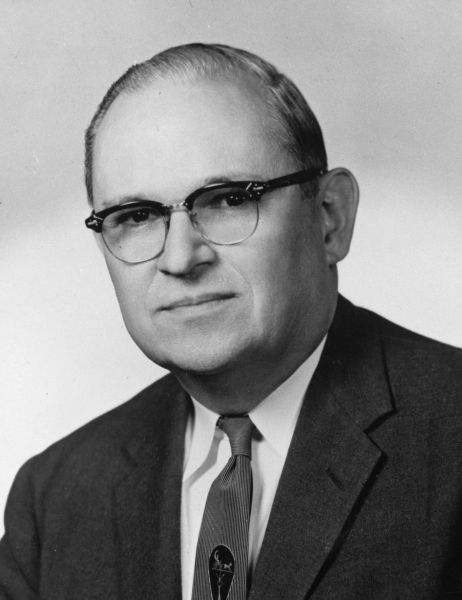 Wheaton College has graduated several students who’ve eventually assumed the presidencies of schools and agencies. Less common is the fact that one Wheaton College teacher, Dr. C. Raymond Ludwigson, serving on staff as Associate Professor of Bible and Philosophy, departed its faculty to accept a college presidency; then, after a six year stint, returned to Wheaton College, resuming his teaching position. An alumnus of Moody Bible Institute and Wheaton College, Ludwigson earned his graduate degree from Chicago Lutheran Seminary and his doctorate from the University of Iowa. Dr. Ludwigson taught at Wheaton College until his appointment in 1949 to the presidency of Trinity College and Seminary in Chicago (now Trinity International University in Deerfield, IL). However, he returned to Wheaton College in September 1955. Throughout his teaching career and after he served as interim pastor at various churches, including Westminster Presbyterian Church in Elgin, IL. Ludwigson was known for a warm, devotional teaching style. He retired from Wheaton College in 1969 and in 1973 published A Survey of Bible Prophecy for Zondervan.
Wheaton College has graduated several students who’ve eventually assumed the presidencies of schools and agencies. Less common is the fact that one Wheaton College teacher, Dr. C. Raymond Ludwigson, serving on staff as Associate Professor of Bible and Philosophy, departed its faculty to accept a college presidency; then, after a six year stint, returned to Wheaton College, resuming his teaching position. An alumnus of Moody Bible Institute and Wheaton College, Ludwigson earned his graduate degree from Chicago Lutheran Seminary and his doctorate from the University of Iowa. Dr. Ludwigson taught at Wheaton College until his appointment in 1949 to the presidency of Trinity College and Seminary in Chicago (now Trinity International University in Deerfield, IL). However, he returned to Wheaton College in September 1955. Throughout his teaching career and after he served as interim pastor at various churches, including Westminster Presbyterian Church in Elgin, IL. Ludwigson was known for a warm, devotional teaching style. He retired from Wheaton College in 1969 and in 1973 published A Survey of Bible Prophecy for Zondervan.
John Ortberg
In recent weeks Dr. John Ortberg addressed the Wheaton College graduates of both the undergraduate College and the Graduate School in the May 2010 Commencement ceremonies. In the following excerpts, he exhorts the Class of 2010 to embrace Wheaton’s mission, “For Christ and His Kingdom.”
It is His kingdom that we seek to be for, not ours. And this means a call to humility, because His kingdom is about something so much bigger, and so much more glorious, than our little evangelical subculture and institutions and movements and churches. But it’s also a call for great boldness, because to be ‘For Christ and His Kingdom’ means that we do not have to be nervous about this world. In a world where so much is down…where the economy is down…where employment is down…where consumer confidence is down…where marital stability is down…where, I know, the odds of finding a great job fresh out of college are down; people wonder is anything up? And some things are. The opportunity to serve a hurting world is up…the power of hope is up…the market for faith is up…and this is so because certain truths remain unchanged:
God remains sovereign…the beauty of forgiveness is still greater than the stain of sin…the Bible still pierces the human soul…prayer remains the most remarkable communication known to the human race…love still beats bigotry…joy still trumps despair…the greatest scandal of this sorry, dark world remains the scandal of the cross…God’s mercies are still new every morning…the tomb is still empty…the Spirit is still descending…the kingdom Jesus announced, which we seek to be for, is still expanding.
To be ‘For Christ and His Kingdom’ is to be for the world that God so loved that he gave His only begotten son.
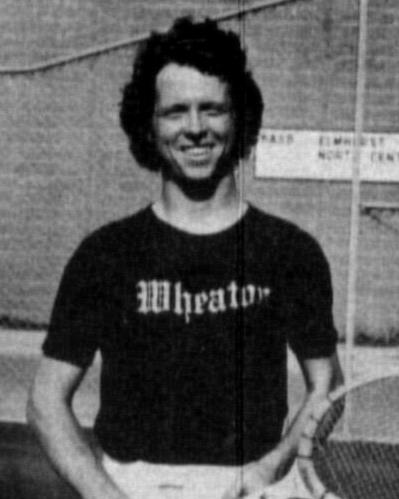 John Carl Ortberg, Jr. was born in 1957 and was raised in Rockford, Illinois. While attending Wheaton College in the late 1970s, Ortberg was a member of the Scholastic Honor Society and graduated summa cum laude in 1979 with a B.A. in psychology. He played men’s tennis all four years, earned the College Conference of Illinois and Wisconsin (CCIW) Most-Valuable Player award, achieved NCAA All-American Honors and reached the quarterfinals in men’s doubles at the NCAA Division III Tennis Championships. During 1978 and 1979 he was the #1 CCIW singles and doubles champion and ranked first in singles and doubles of the Wheaton squad while captain his senior year.
John Carl Ortberg, Jr. was born in 1957 and was raised in Rockford, Illinois. While attending Wheaton College in the late 1970s, Ortberg was a member of the Scholastic Honor Society and graduated summa cum laude in 1979 with a B.A. in psychology. He played men’s tennis all four years, earned the College Conference of Illinois and Wisconsin (CCIW) Most-Valuable Player award, achieved NCAA All-American Honors and reached the quarterfinals in men’s doubles at the NCAA Division III Tennis Championships. During 1978 and 1979 he was the #1 CCIW singles and doubles champion and ranked first in singles and doubles of the Wheaton squad while captain his senior year.
He pursued post-graduate studies at the University of Aberdeen in Scotland and later earned both an Master of Divinity (M.Div.) and a Doctorate (Ph.D.) in Clinical Psychology from Fuller Theological Seminary, where he is currently on the Board of Trustees.
He served as senior pastor at Simi Valley Community Church for five years until 1990, and then until 1994 at Horizons Community Church in Diamond Bar, CA. The Ortbergs moved from California to Illinois for John and his wife, Nancy to serve as teaching pastors at Willow Creek Community Church in South Barrington, Illinois for the next decade.
While living in the Chicagoland area, in March 1997 John and Nancy gave the McManis Lectureship Chapel “Recovering an Evangelical Spirituality” on the campus of Wheaton College.
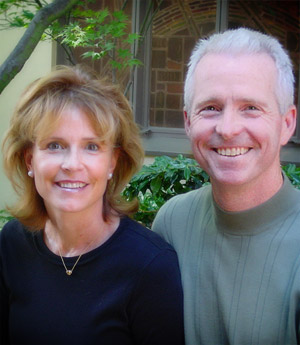 Since 2003 he has served as Senior Pastor of the 4,000 member Menlo Park Presbyterian Church in California. Ortberg is also an author of such Zondervan titles as the 2002 Christianity Today Book Award winner If You Want to Walk on Water, You’ve Got to Get Out of the Boat (2001) and the 2008 ECPA Christian Book Award winner When the Game is Over, It All Goes Back in the Box.
Since 2003 he has served as Senior Pastor of the 4,000 member Menlo Park Presbyterian Church in California. Ortberg is also an author of such Zondervan titles as the 2002 Christianity Today Book Award winner If You Want to Walk on Water, You’ve Got to Get Out of the Boat (2001) and the 2008 ECPA Christian Book Award winner When the Game is Over, It All Goes Back in the Box.
In January 2007 Pastor Ortberg returned to Wheaton and addressed the campus for Spring Special Services in a series of messages entitled “Adventures in Faith.” His pastorate at Menlo Park was also highlighted along with other alumni in the Wheaton Magazine (Winter 2007) issue.
The Ortbergs have three children (Laura, Mallory and John) and live in Menlo Park, CA.
Onomasticon arthurianum
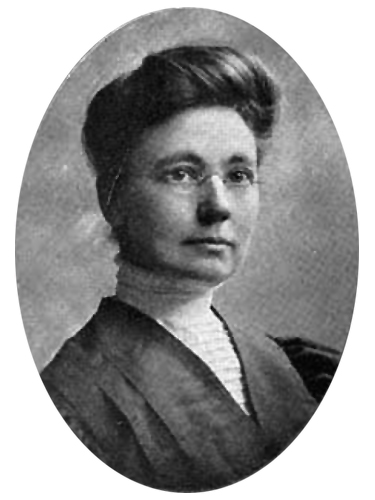 Alma Blount was born in Byron, Illinois on November 29, 1866. She attended local schools and graduated from Byron High School in 1882. Afterward she studied at Wheaton College where she stayed on as an instructor of English after her graduation in 1886. While teaching she continued to take classes and earned a second bachelors degree, the second being a bachelor of science, received in 1890. She left Wheaton in 1893 to pursue further studies at Cornell University where she received her Ph.D. in 1896. Her doctoral work was on “The Original Dialect of the Anglo-Saxon Poem Andreas.” As if this wasn’t enough she also studied at Radcliffe College earning nearly enough credits to receive a masters degree. She also traveled abroad studying at the British Museum, Bibliotheque Nationale and the Sorbonne. She was a member of Kappa Delta Pi, an international education honor society.
Alma Blount was born in Byron, Illinois on November 29, 1866. She attended local schools and graduated from Byron High School in 1882. Afterward she studied at Wheaton College where she stayed on as an instructor of English after her graduation in 1886. While teaching she continued to take classes and earned a second bachelors degree, the second being a bachelor of science, received in 1890. She left Wheaton in 1893 to pursue further studies at Cornell University where she received her Ph.D. in 1896. Her doctoral work was on “The Original Dialect of the Anglo-Saxon Poem Andreas.” As if this wasn’t enough she also studied at Radcliffe College earning nearly enough credits to receive a masters degree. She also traveled abroad studying at the British Museum, Bibliotheque Nationale and the Sorbonne. She was a member of Kappa Delta Pi, an international education honor society.
Blount taught at the Wheaton Academy, Lawrence University (1900-1901) and finished her teaching career at Michigan State Normal College, which became Eastern Michigan University. She contributed to several books in English and Literature, such as the four volume Progressive Studies in English and Intensive Studies in American Literature. She authored over a dozen articles in English and Education journals.
Being from small, parochial, Wheaton College did not cause Miss Blount to shrink from a significant scholarly task, one that some felt could not be undertaken at all by an individual. Her life work was “Onomasticon Arthurianum” that was never published. Housed at the Widener Library at Harvard, this massive work sought to be a comprehensive index of personal and place names in the medieval Arthurian romance lexicon. During her lifetime her work was considered the only guide to the sizable body of Arthurian literature In English and was regarded as one stage, the first, in an effort to compile a fuller Onomasticon Arthurianum. Blount’s index was focused upon more than two hundred Arthurian works in ten languages and she recorded her data on nearly twenty thousand slips. When she recognized that she would not be able to complete her work she deposited it at Harvard so that it would profit other scholars. There was professional disappointment at it not being completed, but also an understanding of the magnitude of the task, especially for one person. Despite the serious limitations of her index, Miss Blount deserves the gratitude of Arthurians, not only because she was a pioneer in a work of almost unexampled size and complexity but also because the concrete results of her labors afford a guide for developing a sounder plan of procedure. Her experience made it clear that any new attempt to achieve the Onomasticon must be carried out in several stages or units.
After reaching the rank of full professor Blount retired in 1935. After a lengthy, debilitating illness, she died in Tempe, Arizona on December 2, 1950.
The Serialized Adventures of Roy J. Snell
Certain writers are famous for one book, such as Harper Lee and To Kill a Mockingbird or Margaret Mitchell and Gone with the Wind. Others generate saleable wordage as easily as sneezing. For instance, Erle Stanley Gardner, creator of unbeatable lawyer Perry Mason, positioned multiple typewriters around his office and simply switched from one manuscript to another. His colleague, English crime novelist John Creasey, wrote 562 novels; and Barbara Cartland published an astonishing 723 Regency romances, aside from several non-fiction titles.
In the world of juvenile fiction, Roy J. Snell wrote somewhat less but lived as large, trekking as hazardously as Ernest Hemingway or Jack London. “Did you ever eat walrus meat?” asked advertisements for Snell’s books. “Did you ever drive a dog team, travel in a boat made of skins, or sleep in a bag?” Gosh, no! replied generations of wide-eyed boys and girls starved for vicarious thrills. But Snell did all this and more, tackling perilous frontiers – deserts, seas and tropics – with gusto and humor. Born in 1880 at Laddonia, Missouri, he moved with his family to northern Illinois where he worked his way through Wheaton Academy and Wheaton College. Graduating in 1906, he enrolled for one year at Harvard Divinity School, then matriculated to Chicago Theological seminary, leaving with his degree in 1916. He received his MA from the University of Chicago in 1917. Moving south he served first as pastor of a small church in rural Illinois, then as principal of the Black Mountain Academy in Evarts, Kentucky, living among the feuding families of the hills. As a missionary he relocated to the Behring Straits, Alaska, where he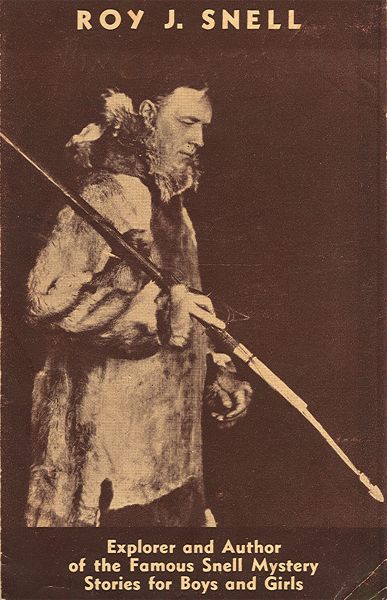 rode herd, directing 350 Eskimos and 1500 Wales reindeer. At one point he sailed the Arctic Ocean in a boat made of skins. Desiring to write the Great American Novel, Snell settled for adventure and mystery tales, drawing from his vast storehouse of experience. His work began rolling from the presses at breakneck speed as he often composed 2000 words per hour without an outline. He sold his first manuscript, Little White Fox and His Arctic Friends, in 1916. Many of his novels were first serialized in Boy’s Life, American Boy and The Youth’s Companion. During WW I he spent six months in France with the YMCA, serving as a mechanic. Here he met missionary Lucille Ziegler, whom he married in 1920. During their honeymoon he wrote a book. After the war Snell returned to Wheaton, residing with his family at 705 N. Wheaton Ave. For 20 years during the holidays he worked incognito at Marshall Field’s and Carson’s in Chicago, hand-selling his own titles over-the-counter to unsuspecting customers. Further bolstering book and magazine sales, he lectured annually in Detroit schools about Eskimo ways, struggling into a deerskin parka while demonstrating how to throw harpoons, or how to catch a tame monkey gone wild. “A pan of glue is substituted for water,” he explained. “Mr. Monk washes his face with glue. His eyes are stuck fast together and he is easily caught.”
rode herd, directing 350 Eskimos and 1500 Wales reindeer. At one point he sailed the Arctic Ocean in a boat made of skins. Desiring to write the Great American Novel, Snell settled for adventure and mystery tales, drawing from his vast storehouse of experience. His work began rolling from the presses at breakneck speed as he often composed 2000 words per hour without an outline. He sold his first manuscript, Little White Fox and His Arctic Friends, in 1916. Many of his novels were first serialized in Boy’s Life, American Boy and The Youth’s Companion. During WW I he spent six months in France with the YMCA, serving as a mechanic. Here he met missionary Lucille Ziegler, whom he married in 1920. During their honeymoon he wrote a book. After the war Snell returned to Wheaton, residing with his family at 705 N. Wheaton Ave. For 20 years during the holidays he worked incognito at Marshall Field’s and Carson’s in Chicago, hand-selling his own titles over-the-counter to unsuspecting customers. Further bolstering book and magazine sales, he lectured annually in Detroit schools about Eskimo ways, struggling into a deerskin parka while demonstrating how to throw harpoons, or how to catch a tame monkey gone wild. “A pan of glue is substituted for water,” he explained. “Mr. Monk washes his face with glue. His eyes are stuck fast together and he is easily caught.”
By the end of his life Snell had published 82 novels, with over two million sold. “I also wrote something like a thousand Sunday School stories for the David C. Cook Pub. Co. of Elgin,” he matter-of-factly informs the Wheaton College Alumni Association in a 1959 update. Later that year he suffered chest pains and was taken to DuPage Memorial Hospital in Elmhurst. Four days later his earthly odyssey ended. “I’ve had my day,” Snell once told a reporter, “and got out of it exactly what I wanted.” He was survived by his wife and three sons.
Frank Dyrness
On March 22, 2010, Dr. Nicholas Perrin, Associate Professor of New Testament, gave his inaugural lecture as holder of the Franklin S. Dyrness Chair of Biblical Studies entitled “The Bible from Westminster to Muenster: The Interface between Theological Confession and Free Historical Inquiry.” Dr. Perrin holds degrees from The Johns Hopkins University (B.A. 1986), Covenant Theological Seminary (M.Div. 1994), and Marquette University (Ph.D. 2001). His dissertation was “Thomas and Tatian: The Relationship between the Gospel of Thomas and the Diatessaron.”
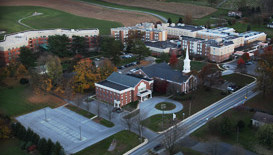 The history of the Franklin Dyrness Chair dates back nearly a quarter-century to 1987 when the Class of ’27 alumnus and founder of the Quarryville Presbyterian Retirement Community contributed funds toward an endowed chair of biblical studies. C. Hassell Bullock was named the first distinguished chair until his retirement in 2009 after thirty-six years as Professor of Old Testament.
The history of the Franklin Dyrness Chair dates back nearly a quarter-century to 1987 when the Class of ’27 alumnus and founder of the Quarryville Presbyterian Retirement Community contributed funds toward an endowed chair of biblical studies. C. Hassell Bullock was named the first distinguished chair until his retirement in 2009 after thirty-six years as Professor of Old Testament.
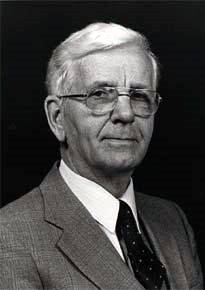 Franklin Seth Dyrness was born May 16, 1905 in Chicago, Illinois to Norwegian-born parents who immigrated to the United States. He attended Wheaton College was president of the Beltionian Literary Society, junior class president and played football; he graduated in 1927. He briefly taught science at the Wheaton Academy and was married to fellow classmate, Dorothy Rasmussen in 1931. They would eventually raise five children. Dyrness also graduated from Westminster Theological Seminary in 1931 and pastored the Chestnut Level Presbyterian Church in Quarryville, PA through 1936. He was then installed as the first pastor of an independent Presbyterian Church in later to become Faith Orthodox Presbyterian Church, and then as Faith Reformed Presbyterian Church. He served as pastor for twenty-six years until 1963. Under this pastorate the church helped organize the Quarryville Bible Conference Association for the purpose of organizing summer camps and conferences for all ages. Dyrness served as its president for five years, and executive director for thirty-seven years. In 1948, he and a group of associates founded the Quarryville Presbyterian Home. Franklin held the position of president from 1948 until he retired in December 1985 at eighty-one years old. His honors include election to the Wheaton College Honor Society and the conferring of the degree Doctor of Divinity by Wheaton in its centennial year of 1960. On the 60th anniversary of his graduation from Wheaton, the Home and the College contributed funds to establish the Franklin S. Dyrness Chair of Biblical Studies at Wheaton College.
Franklin Seth Dyrness was born May 16, 1905 in Chicago, Illinois to Norwegian-born parents who immigrated to the United States. He attended Wheaton College was president of the Beltionian Literary Society, junior class president and played football; he graduated in 1927. He briefly taught science at the Wheaton Academy and was married to fellow classmate, Dorothy Rasmussen in 1931. They would eventually raise five children. Dyrness also graduated from Westminster Theological Seminary in 1931 and pastored the Chestnut Level Presbyterian Church in Quarryville, PA through 1936. He was then installed as the first pastor of an independent Presbyterian Church in later to become Faith Orthodox Presbyterian Church, and then as Faith Reformed Presbyterian Church. He served as pastor for twenty-six years until 1963. Under this pastorate the church helped organize the Quarryville Bible Conference Association for the purpose of organizing summer camps and conferences for all ages. Dyrness served as its president for five years, and executive director for thirty-seven years. In 1948, he and a group of associates founded the Quarryville Presbyterian Home. Franklin held the position of president from 1948 until he retired in December 1985 at eighty-one years old. His honors include election to the Wheaton College Honor Society and the conferring of the degree Doctor of Divinity by Wheaton in its centennial year of 1960. On the 60th anniversary of his graduation from Wheaton, the Home and the College contributed funds to establish the Franklin S. Dyrness Chair of Biblical Studies at Wheaton College.
Surrounded by his family members, Franklin S. Dyrness ’27, D.D. ’60 died June 16, 1990, at the Presbyterian Home he founded in Lancaster County, Pennsylvania. In a letter to the Wheaton College Alumni Association, his son F. Seth, Jr. wrote…
We gathered around his bed and sang some of his favorite hymns for him. As we sang the final verse of ‘Rock of Ages,’ he closed his eyes and went to he with the Lord, It was beautiful and deeply comforting for us as a family. The funeral was a very uplifting time of celebrating God’s abundant faithfulness. Dr. Armerding preached an excellent message challenging us to faithfulness to Christ with eternity’s values in view. We are deeply grateful to God for giving us a father who taught us to put God first in our lives. Together with Mother and Dad, we thank God for the profound impact Wheaton has had on us in nurturing our souls and challenging us to follow Christ.
The Franklin S. Dyrness Papers reside in the Presbyterian Church in America (PCA) Historical Center Archives, St. Louis, Missouri.
Raymond P. Fischer and the American Institution
Raymond P. Fischer possessed a mind both meticulous and imaginative. Born the youngest of twelve in the same house in which his grandfather, Jonathan Blanchard, died, he attended Wheaton College (1918-20) and Pomona College (1922) in California, before matriculating to Harvard law school, graduating in 1924. Undoubtedly he was quite proud of his degree, which equipped him for a fifteen-year practice with Campbell, Clithero and Fischer, located on La Salle St. in Chicago. Ending his legal career in 1941 he then served variously as executive vice-president of the Cuneo Press, president of Combined Paper Mills, director of the National Tea Company, and sat on the Chicago advisory board for the Salvation Army. Retiring from the paper and printing business, he established Associated Consultants of Wheaton, Illinois. Away from board rooms he was a licensed lay leader in the Episcopal Church, and belonged to the Chicago Golf and Union League clubs. But aside from responsible positions and high honors, Fischer was likely rather pleased with a quieter achievement, not in law or business, but now the world of letters.
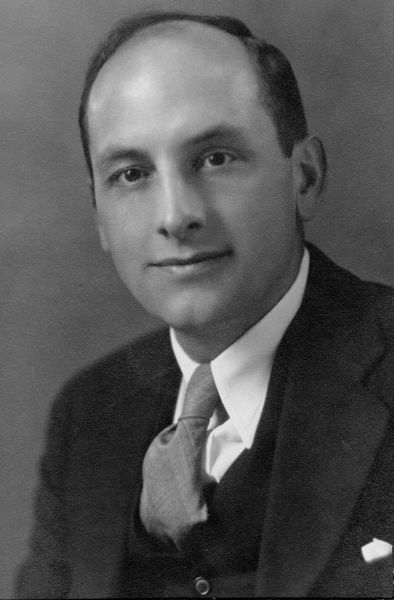 While still in prep school Fischer mailed a submission to Harriet Monroe (1860-1936), the formidable founder and editor of Poetry magazine. Shortly thereafter, ever scouting for fresh talent, she generously invited him to visit her at the old offices on Erie Street, Chicago, there to discuss improvements. Monroe, pivotal in publicizing the revolutionary work of Carl Sandburg, Marianne Moore, Wallace Stevens and Ezra Pound, also first printed “The Love Song of J. Alfred Pufrock” by T.S. Eliot, who later called Poetry “an American Institution.” Fischer’s corrections were deemed acceptable and his first publication, “A Year,” appeared in May, 1922. Though he saw his name in print, he did miss a few perks. “A regret regarding Poetry,” he recalls, “is that I was unable to attend a white tie dinner which the magazine gave for William Butler Yeats to which I was invited but did not go, because the dress suit of an older brother was several sizes too large for me.” His disappointment probably lightened when Poetry again accepted his work in 1924, then 1929, and again, fifty-five years later, in 1984.
While still in prep school Fischer mailed a submission to Harriet Monroe (1860-1936), the formidable founder and editor of Poetry magazine. Shortly thereafter, ever scouting for fresh talent, she generously invited him to visit her at the old offices on Erie Street, Chicago, there to discuss improvements. Monroe, pivotal in publicizing the revolutionary work of Carl Sandburg, Marianne Moore, Wallace Stevens and Ezra Pound, also first printed “The Love Song of J. Alfred Pufrock” by T.S. Eliot, who later called Poetry “an American Institution.” Fischer’s corrections were deemed acceptable and his first publication, “A Year,” appeared in May, 1922. Though he saw his name in print, he did miss a few perks. “A regret regarding Poetry,” he recalls, “is that I was unable to attend a white tie dinner which the magazine gave for William Butler Yeats to which I was invited but did not go, because the dress suit of an older brother was several sizes too large for me.” His disappointment probably lightened when Poetry again accepted his work in 1924, then 1929, and again, fifty-five years later, in 1984.
His verse collection, An Aged Man Remembers April (1985), is dedicated to Monroe, “who showed me that both inspiration and revision are essential.” Dr. Jill P. Baumgaertner, now Professor of English and Dean of Humanities and Theological Studies at Wheaton College, lauds its “…melodic echoes of Frost, Wordsworth, Keats, scripture…It is a stunning combination of sound and form, metaphor and story that lingers long after you’ve closed the book. This is poetry rooted in a real tradition of living and writing. This is poetry that will last.” In 1987 Fischer assembled four decades of research and published Four Hazardous Journeys of Jonathan Blanchard, chronicling his grandfather’s antislavery travels and fundraising adventures during the Montana Territory gold rush. Theologian Carl F.H. Henry, writing the foreword, commends “…its graphic picture window on frontier life a century as a reminder of the dedication of abolitionists in a time of social crisis.” Fischer and his wife, Marita, had one daughter. The aged poet-lawyer-businessman was the last surviving grandson of Blanchard when he lay down his pen forever at age 89 in 1990.
Zane C. Hodges
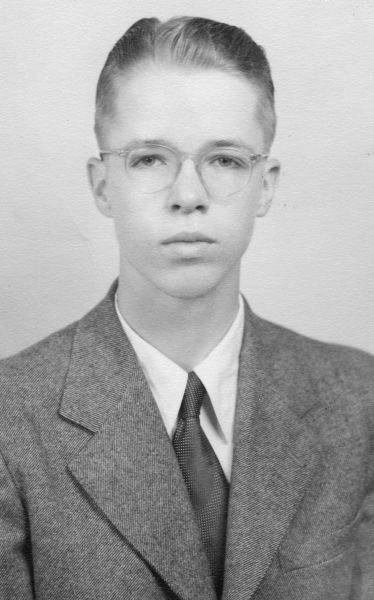 Wheaton College has provided intellectual incubation for many prominent theologians, professors and pastors. Surely one of the most brilliant was Zane Clark Hodges. Born in Washington, DC, but raised primarily in Chambersburg, Pennsylvania, Hodges attended a Plymouth Brethren assembly with his parents and younger brother because there were no Baptist churches in town. Blessed with a sturdy intellect, he completed fifth and sixth grades in one year. During his high school junior year he became editor-in-chief of the student newspaper while participating in the Debating and Latin clubs. Reading widely, he also enjoyed comic books, which he collected, and played baseball. Hodges accepted Christ’s gift of eternal life at a meeting on the Greenwood Hills Bible Conference grounds in 1946. “Since that time,” he writes in his 1949 Wheaton College application, “I not only embrace the Lord Jesus as my Saviour, but also as the Son of God and the one who keeps me and is coming back, perhaps soon.” During this period he desired to enter the mission field as his life’s work. At college Hodges studied Greek, French and German, and further honed his analytical and oratorial skills with the Beltionian Literary society. The administration noted his poised, modest aspect, along with his industry and efficiency. As a result of his academic prowess he was inducted into the Honor Society. He was graduated in 1954, receiving his BA in Greek. Dr. Clarence Hale, Chairman of the Department of Foreign Languages, prophetically observes on Hodges’s placement form: “[He] is a young man of thoroughly reliable character and very high scholarship. He presents a neat appearance and meets people easily. He gives the promise of becoming a well-trained Bible teacher.” From Wheaton Hodges matriculated to Dallas Theological Seminary (DTS) where he acquired his Th.M. before joining its faculty as professor of New Testament Literature and Exegesis, remaining for 27 years until departing to pursue speaking and writing. Hodges produced commentaries on Hebrews, 1-3 John and James, in addition to writing articles for Bibliotheca Sacra, the scholarly journal for DTS. With Arthur Farstad he co-edited The Greek New Testament According to the Majority Text.
Wheaton College has provided intellectual incubation for many prominent theologians, professors and pastors. Surely one of the most brilliant was Zane Clark Hodges. Born in Washington, DC, but raised primarily in Chambersburg, Pennsylvania, Hodges attended a Plymouth Brethren assembly with his parents and younger brother because there were no Baptist churches in town. Blessed with a sturdy intellect, he completed fifth and sixth grades in one year. During his high school junior year he became editor-in-chief of the student newspaper while participating in the Debating and Latin clubs. Reading widely, he also enjoyed comic books, which he collected, and played baseball. Hodges accepted Christ’s gift of eternal life at a meeting on the Greenwood Hills Bible Conference grounds in 1946. “Since that time,” he writes in his 1949 Wheaton College application, “I not only embrace the Lord Jesus as my Saviour, but also as the Son of God and the one who keeps me and is coming back, perhaps soon.” During this period he desired to enter the mission field as his life’s work. At college Hodges studied Greek, French and German, and further honed his analytical and oratorial skills with the Beltionian Literary society. The administration noted his poised, modest aspect, along with his industry and efficiency. As a result of his academic prowess he was inducted into the Honor Society. He was graduated in 1954, receiving his BA in Greek. Dr. Clarence Hale, Chairman of the Department of Foreign Languages, prophetically observes on Hodges’s placement form: “[He] is a young man of thoroughly reliable character and very high scholarship. He presents a neat appearance and meets people easily. He gives the promise of becoming a well-trained Bible teacher.” From Wheaton Hodges matriculated to Dallas Theological Seminary (DTS) where he acquired his Th.M. before joining its faculty as professor of New Testament Literature and Exegesis, remaining for 27 years until departing to pursue speaking and writing. Hodges produced commentaries on Hebrews, 1-3 John and James, in addition to writing articles for Bibliotheca Sacra, the scholarly journal for DTS. With Arthur Farstad he co-edited The Greek New Testament According to the Majority Text.
Hodges’s position on “free grace” generated considerable agitation after Dr. John F. MacArthur, pastor of Grace Community Church in Sun Valley, CA, published The Gospel According to Jesus (1988). MacArthur advocates the traditional Reformed view that biblical salvation inevitably produces works as the result of submitting to Christ’s lordship. The ongoing practice of goods works indicates the presence of the Holy Spirit in the Christian. Conversely, the absence of good works demonstrates a false profession. Two years later Hodges countered MacArthur’s thesis with Absolutely Free!, declaring that Christ’s gift of eternal life is contingent upon nothing beyond believing. According to Hodges, “lordship salvation” unnecessarily distorts the otherwise simple faith message by subtly introducing the contribution of human effort into Christ’s finished atonement. In brief, good works are the evidence, not the result, of salvation.
As a founding member of Grace Evangelical Society (GES), Hodges continued promoting the doctrine of free grace through newsletters, conferences and the Journal of the Grace Evangelical Society, for which he occasionally wrote. The organization is currently headed by Dr. Bob Wilkin, whose Master’s and Doctoral dissertations were overseen by Hodges at DTS. Aside from seminary teaching, he preached widely in churches and for nearly 50 years pastored Victor Street Bible Chapel in Dallas. In addition to exegesis, theology and textual criticism, he continued his expansive reading with particular fondness for mysteries, biography, ancient history and science fiction. Hodges had written a few chapters for commentaries on Romans and the Gospel of John before he died at 76 on November 23, 2008. He never married. His funeral was preached by his friend and pastor, Dr. Tony Evans of Oak Cliff Bible Fellowship.
Some biographical material is provided by Dr. Bob Wilkin of the Grace Evangelical Society and Dr. John Hannah’s Uncommon Union: Dallas Theological Seminary and American Evangelicalism (2009).